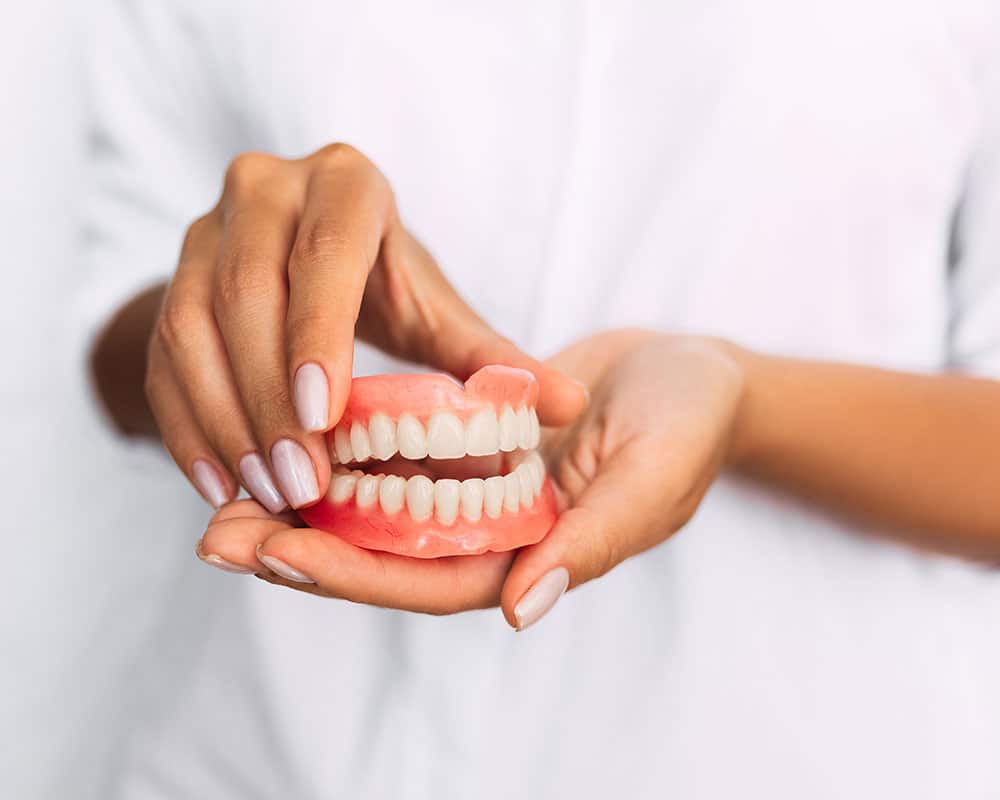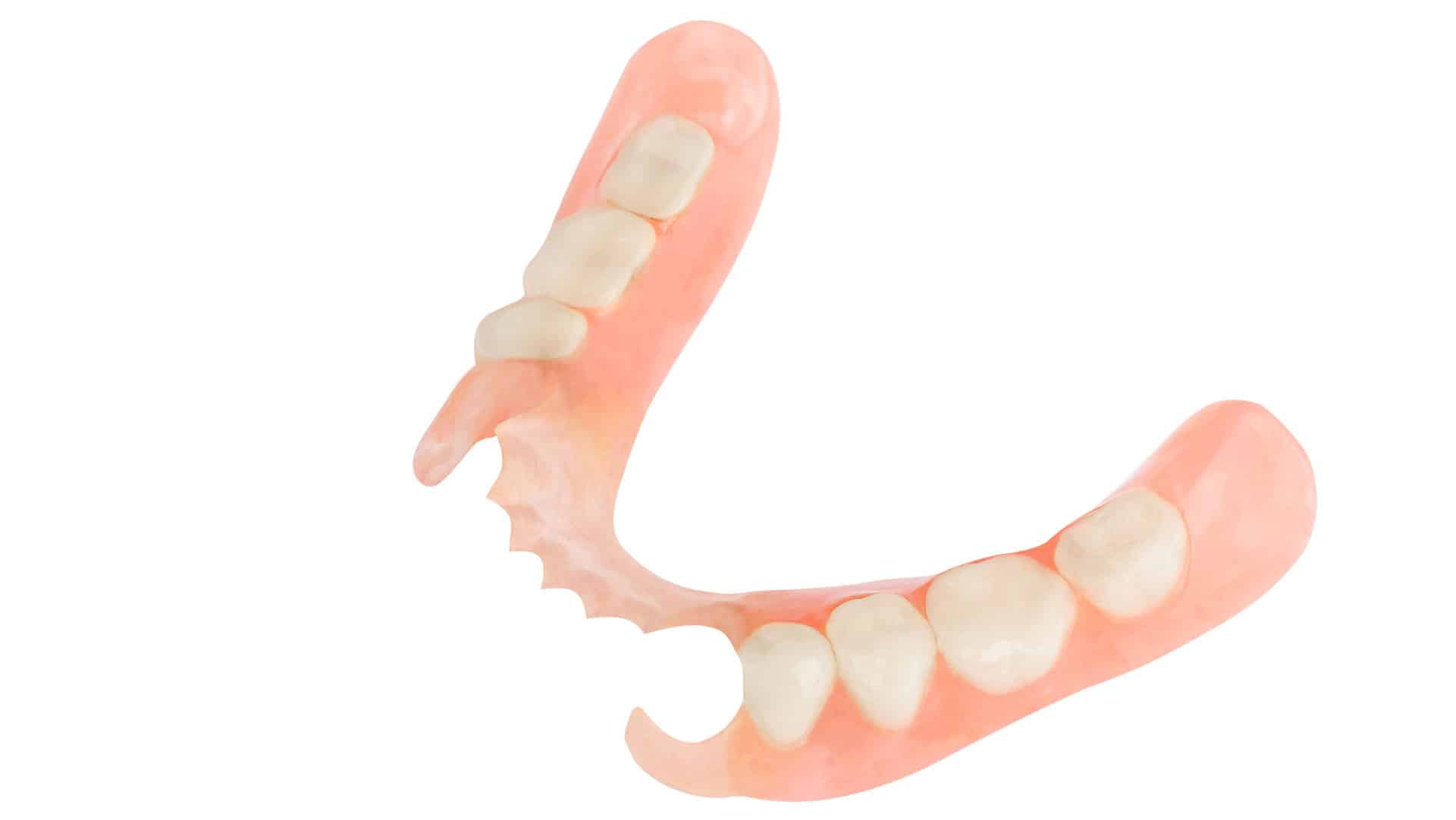Partials & Dentures
Schedule a Complimentary Consultation
Schedule Your Appointment Today Call Now: (805) 526-1000If you have lost your teeth because of trauma, gum diseases or tooth decay, replacing your missing teeth will benefit your appearance and oral health. When you lose teeth, facial muscles become weak provoking gum recession and making you look older.
Dentures can help resemble your natural teeth and improve the look of your smile. There are two main types of dentures available in our dental office: full dentures needed when there are no teeth left in the mouth, and partial dentures used when some teeth are still there. Dentures are custom-made appliances based on impressions of your mouth. If you have doubts, we will help you determine which type of dentures is best for you.
Follow Us On Instagram To See Before and Afters
@elitedentistryofsimivalley
Partial Denture
Here are several types of partial dentures you can choose from:
Aesthetic Partial Denture
Removable partial denture consists of artificial teeth attached to a gum-colored base made of plastic. Depending on your situation, the dentist will design custom dentures for you. It may have metal clasps to connect to your teeth or other types of connections that look more natural. Crowns on the teeth that serve as attachments will need some adjustments to ensure proper fit.
Valplast Partial Denture
Valplast is a flexible material consisting of biocompatible nylon and thermoplastic resin. It is a perfect base for partial dentures. Valplast provides a high degree of flexibility and stability to any dental restoration. Moreover, the shape, color, and design of valplast dentures ideally blend with the tissues’ appearance, making your prosthetic device invisible. Valplast dentures are nonallergic, light-weighted and free of metallic taste.
Implant-supported Partial Denture
An implant-supported denture is supported by implants placed in your jaw. Implants help create a better fit and make you feel more comfortable in your dentures, allowing you to eat and speak better. Dentures that are supported by dental implants triple the biting force making it easy to eat hard, crunchy and chewy food. Moreover, implant-supported dentures have a more natural appearance.
Full Dentures
Full dentures are made of a plastic gum-colored base that supports a set of porcelain or plastic teeth.
There are several types of full dentures available in our dental office:

Conventional Denture
A conventional denture is applied after the gum tissue completely heals – it usually takes a few months (that only applies if you are removing teeth and waiting for your gums to heal if no healing needed you could start the fabrication of new dentures same day). During the waiting period, you will have to live without teeth. A conventional denture is a durable prosthetic device. However, as facial muscles can sag over time, your dentures may need to be remade and readjusted.
Immediate Denture
You can get an immediate denture on the same day following the removal of your natural teeth. Immediate denture technique involves making impressions of your mouth when your teeth are still present. When you have your teeth extracted, your dentures will be ready, so you won’t spend any minute without teeth. With an immediate denture, your speech is established easier and you don’t have to relearn how to speak. Moreover, you will chew better and have less risk of facial distortion that usually occurs when teeth are extracted. However, immediate dentures don’t always fit accurately and, after the healing process, they need to be replaced by another prosthetic device. Thus, immediate dentures should rather be considered as a temporary treatment.
Next-day Denture
As the name implies, this type of denture is placed on the next day after your teeth have been removed. The procedure is similar to getting immediate dentures. This would not be preferred if you had extractions done the day before because your gums would be very inflamed and swollen and would be very uncomfortable to wear, this is ideal only if you have missing teeth more than a 6 week period.
Overdenture
Unlike traditional dentures that are resting on the gums, overdentures are supported by dental implants. Overdenture is a good solution for those patients that have few or no teeth left and enough bone to support implants (at least 2 implants are needed for proper denture fit). Overdenture remains in place more firmly than traditional dentures and give you more possibilities to eat chewy and hard foods. With this type of prosthetic appliance, you won’t need an adhesive to retain your denture in place. Moreover, implant-supported full dentures preserve your jaw bone from resorption.

How Long Does It Take to Get Used to the Dentures?
During the first weeks or months, you may feel uncomfortable wearing your dentures. It also takes some time and effort to relearn how to speak and eat properly. The usual after-effects may include soreness, excessive saliva, a feeling that your tongue doesn’t have enough space.
Caring Your Dentures
Regardless of the type of removable dentures, they need regular cleaning and special care. Here are some helpful tips to care for your dentures:
- Always remove your dentures when you brush the tongue, gums, and mouth with a soft brush.
- When handling your denture, fill the sink with water or use a towel to prevent dentures’ breaking if dropped.
- Brush your denture on a daily basis removing food debris and plaque. Brushing may also prevent dentures from staining. If you wear a partial denture, it is better to use a separate soft toothbrush to clean it.
- Rinse your denture with warm water after each meal, when possible.
- You can also use special ultrasonic cleaners for superior dentures cleaning.
- Keep your dentures in water, salt water or special denture solution, otherwise, the acrylic base may dry out, causing a bad fit.
- Remove your denture when going to sleep to allow your gums to breathe as well as to avoid irritation and discomfort.
- In case you experience soreness for a long period of time, it means that the denture puts too much pressure. Visit your dentist to make proper adjustments.
- Never adjust the dentures by yourself. In case of any problems, such as dentures’ break, chips or cracks, visit your dentist as soon as possible.